- Contents
- Is this an accurate description of African Gen Z?
- They do digital jobs since they are Tech savvy
- They are lazy and not ambitious
- The Traditional and Cultural Values of Gen Z in Kenya and Africa
- They are mobile-first with high phone usage
- They are all the same across Africa
- They do not care about serious matters
- Gen Z is killing TV, Radio, and Print
- Leading the Charge on Sustainability
- Key Attributes Gen Z Values in Brand Consumption
- The rise of Gen Apha
- Methodology/About this Survey
Gen Z, born from 1997 to the early 2012, is playing a transformative role in reshaping global perceptions of Africa. They are breaking free from outdated stereotypes and showcasing an innovative and dynamic image of Africa through social media and digital platforms.
This generation is viewed as tech-savvy, mobile-centric, and actively involved in creative and entrepreneurial pursuits, ranging from tech startups to artistic endeavours. They are vocal about political and social issues, often leveraging hashtags such as #RejectFinanceBill to advocate for change.
Is this an accurate description of African Gen Z?
Since the term “Millennial” was defined by market researchers, similar stereotypes have been applied to each generation. Millennials were often labeled as entitled and lazy, living with their parents, with these assumptions popularized by Joel Stein’s May 2013 Time magazine article. However, these oversimplified characterizations overlook the diverse realities of each generation.
Just as the Baby Boomers were dubbed the “Me Decade” in the 1970s and Generation X was termed the “Video Generation” in the 1980s, Gen Z in Africa is often misunderstood. GeoPoll conducted a nationwide survey in Kenya among 1986 youth, of ages 18 to 27 aimed to clarify the true habits and preferences of this emerging generation.
They do digital jobs since they are Tech savvy
Despite Kenya’s significant technological advancement and the global shift towards remote work, the GeoPoll survey indicates that a majority of respondents, specifically 66.71%, are currently unemployed. Additionally, 19.38% of those surveyed are employed, while 13.46% own a small business. This data sheds light on the current employment landscape in Kenya despite advancements in technology and the growing trend of remote work.
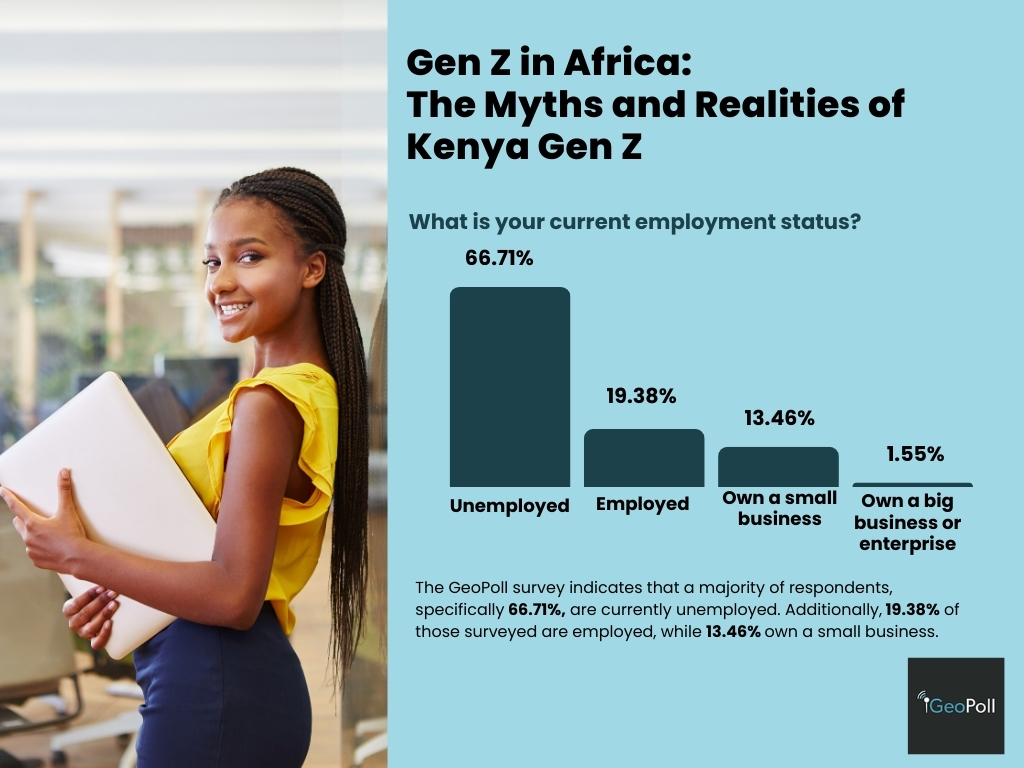
They are lazy and not ambitious
While a significant portion of Gen Z in Kenya is experiencing unemployment, members of other generations often perceive them as lazy and lacking in ambition. However, when Gen Z respondents were asked to assess their ambition relative to that of other generations, the results painted a different picture. An overwhelming 82.87% of Gen Z respondents consider themselves ambitious. Furthermore, 11.85% believe they are somewhat more ambitious than previous generations, with only 3.48% expressing neutrality and a mere 3.22% viewing themselves as less ambitious.
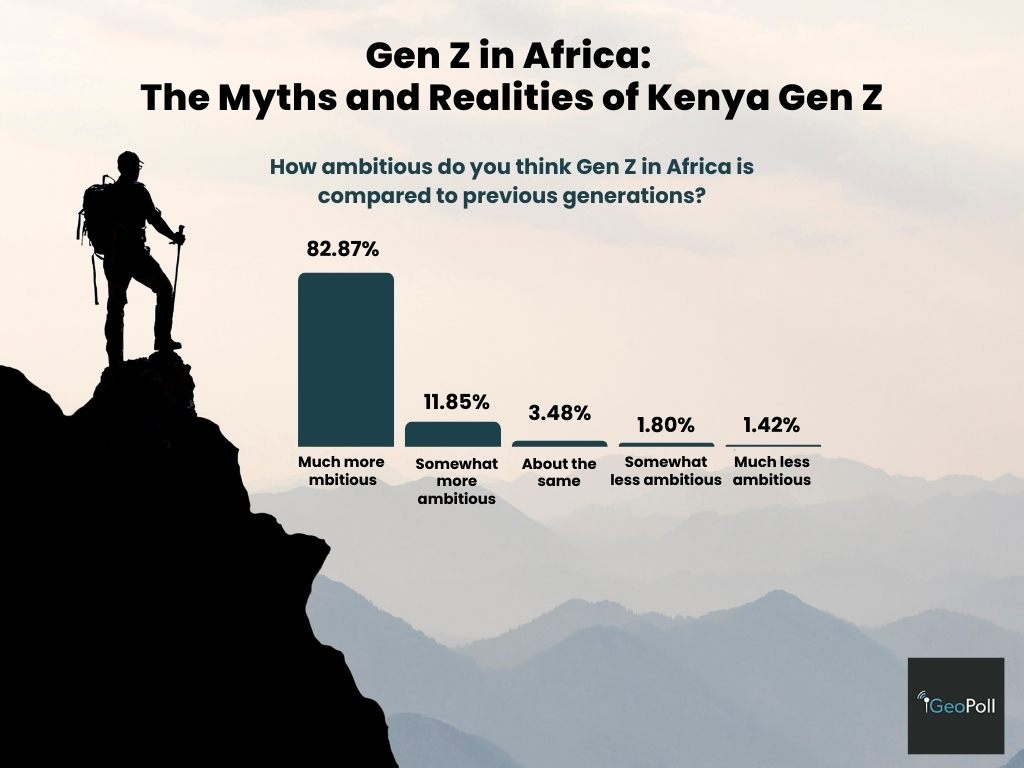
This highlights a striking disparity between generational perceptions and Gen Z’s self-assessment, underscoring their determination and drive in the face of economic challenges.
Gen Z’s Belief in the Importance of Education
Though previous generations have commonly emphasized the significance of education for future opportunities, Gen Z overwhelmingly shares this belief. The study reveals that 91.05% of Gen Z respondents consider education to be important, with an additional 7.92% believing it to be somewhat important. Only 3.35% of respondents do not view education as important. These statistics illustrate that, akin to their predecessors, Gen Z places great value on education as a crucial determinant of future success.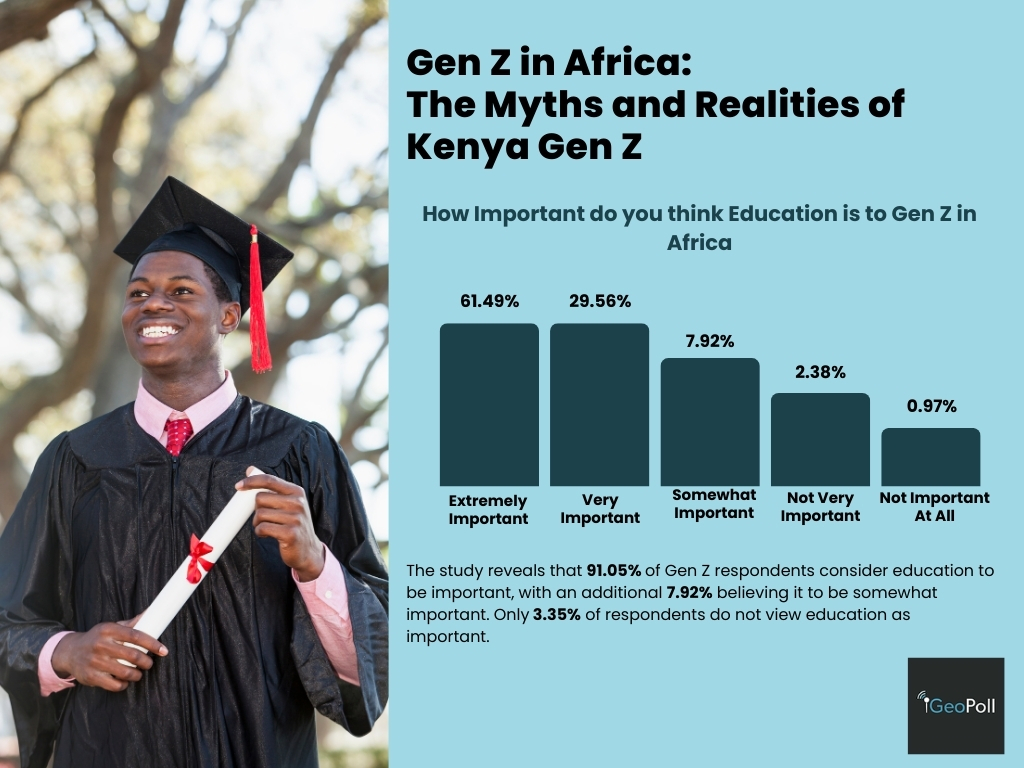
The Traditional and Cultural Values of Gen Z in Kenya and Africa
Kenya, like much of Africa, is known for valuing traditions and preserving cultural heritage. However, there is a common perception that Gen Z lacks respect for these traditions and cultural practices. The survey opinions were divided; 27.62% of respondents believe that Gen Z does not highly regard traditions and cultural practices. 27.56% feel that Gen Z values these traditions very much. 22.34% remain neutral. 15.71% believe Gen Z somewhat values traditions and culture.
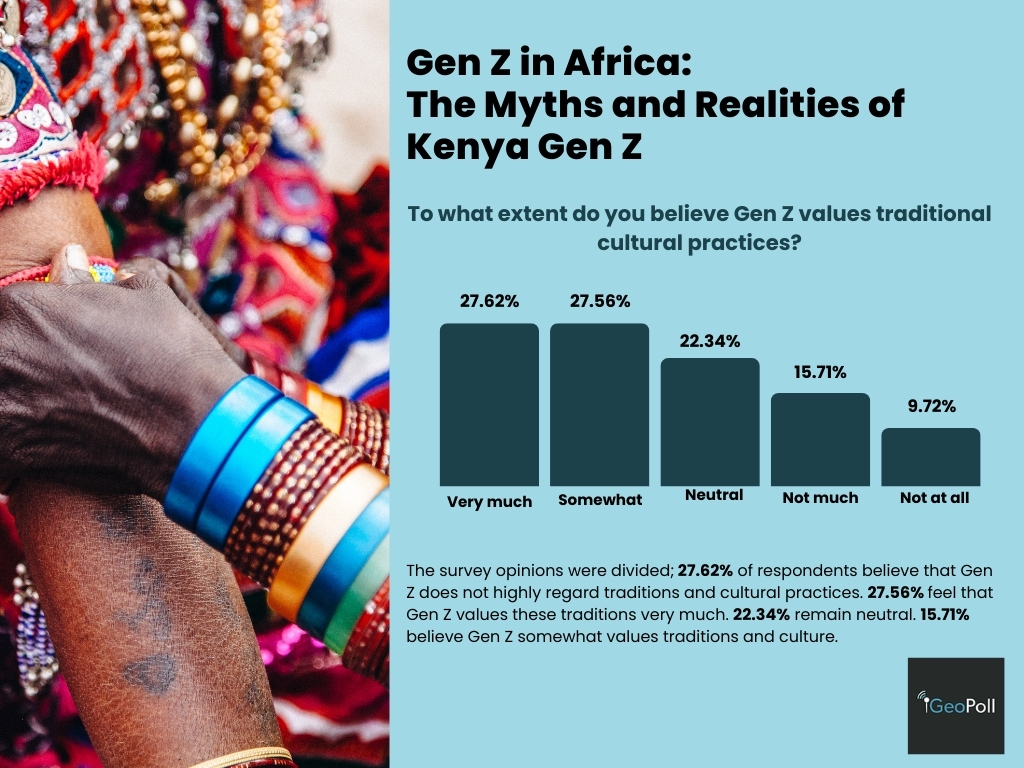
These findings reveals the view of Gen Z’s relationship with tradition and culture, highlighting a significant portion of the generation that still values cultural practices, despite the prevailing perceptions.
They are mobile-first with high phone usage
Gen Z’s defining characteristic is their reliance on mobile technology. According to the GeoPoll survey, an overwhelming 96.26% of respondents agree that they rely on mobile phones for communication and daily activities. Additionally, 2.90% of respondents sometimes rely on technology for communication, while only 2% do not depend on it at all.
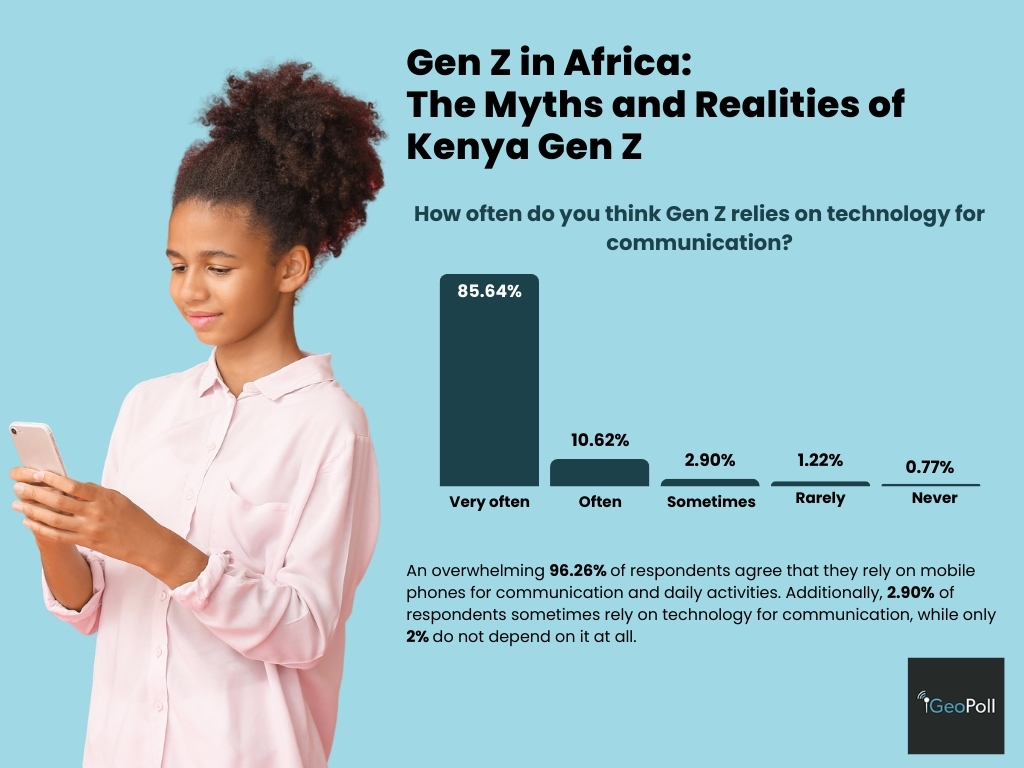
This strong dependence on mobile technology demonstrates Gen Z’s mobile-first approach to interacting and engaging with the world around them.
They are all the same across Africa
According to AKI, Generation Z is currently the largest generation in Africa with 428,514,686 inhabitants making up 31.20% of the population. Among Kenyan Gen Z, opinions on contemporary sentiments are varied. A significant 36.06% strongly agree with these statements, while 35.35% agree. Meanwhile, 17.06% remain neutral, and 13.78% do not agree with these sentiments.
They do not care about serious matters
The idea that Gen Z is apathetic towards political and civic issues is a misconception. According to a GeoPoll survey, a significant 63.30% of respondents stated that they are very involved in politics and public affairs. Additionally, 21.57% reported being somewhat involved, while 9.79% remained neutral. Only 4.83% were somewhat uninvolved, and a mere 2.83% refrained from political engagement altogether. These findings highlight Gen Z’s strong interest and active participation in shaping their political and civic landscape.

Gen Z is killing TV, Radio, and Print
Despite the rise of social media, TV and radio remain dominant in Africa. Sub-Saharan consumers typically watch TV or listen to the radio daily. However, Gen Z’s approach to media is changing. A majority of Gen Z relay on social media for news and entertainment. A recent GeoPoll study shows that, 57% of people prefer social media for immediate and interactive content, especially younger people. TV comes next at 25%, showing that it still plays a significant role in delivering news and entertainment. Radio and news websites are tied at 7% each, catering to more specific and niche audiences.
Leading the Charge on Sustainability
According to the United Nations, The Sustainable Development Goals are a call for action by all countries – poor, rich and middle-income – to promote prosperity while protecting the planet. They recognize that ending poverty must go hand-in-hand with strategies that build economic growth and address a range of social needs including education, health, social protection, and job opportunities, while tackling climate change and environmental protection.
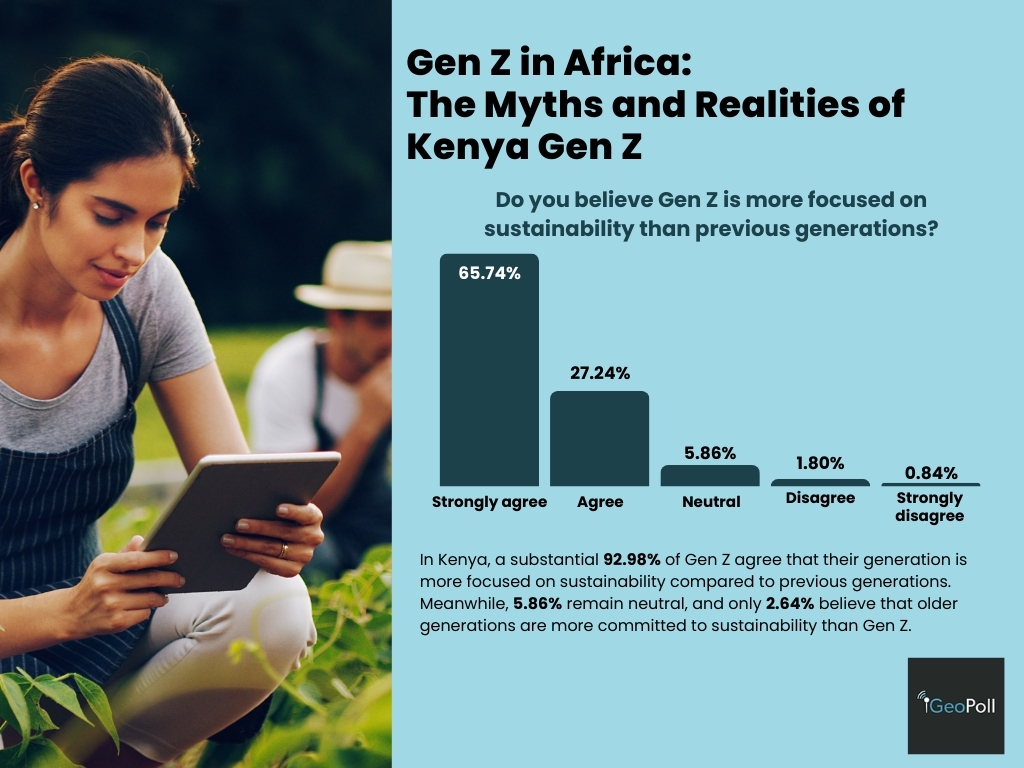 In Kenya, a substantial 92.98% of Gen Z agree that their generation is more focused on sustainability compared to previous generations. Meanwhile, 5.86% remain neutral, and only 2.64% believe that older generations are more committed to sustainability than Gen Z.
In Kenya, a substantial 92.98% of Gen Z agree that their generation is more focused on sustainability compared to previous generations. Meanwhile, 5.86% remain neutral, and only 2.64% believe that older generations are more committed to sustainability than Gen Z.
Key Attributes Gen Z Values in Brand Consumption
When it comes to brand consumption, Gen Z places high importance on several key attributes:
- Quality of Products/Services (81.71%): The most critical factor for Gen Z is the quality of the products or services offered. They prioritize durability, effectiveness, and overall excellence, ensuring that their purchases meet high standards.
- Price and Affordability (56.99%): Close behind quality is the consideration of price and affordability. Gen Z seeks value for money, looking for brands that offer competitive pricing without compromising on quality.
- Brand Reputation and Trust (41.85%): Reputation and trust play a significant role in their purchasing decisions. Gen Z is drawn to brands with positive reputations and those they can trust to deliver on their promises.
- Customer Service Experience (41.34%): Finally, the customer service experience is crucial. Gen Z values responsive, helpful, and efficient customer support, reflecting their desire for a smooth and satisfying interaction with brands.
These attributes reflect Gen Z’s comprehensive approach to brand loyalty, emphasizing not just the product itself but also the overall experience and value associated with their purchases.
The rise of Gen Apha
Generation Alpha, born between 2010 and 2024, is the first group to come of age entirely in the 21st century, surrounded by advanced technology from the start. Known for their natural understanding of digital tools, Gen Alpha is poised to become the most tech-savvy and interconnected generation yet. Growing up with access to AI, virtual reality, and the internet from an early age, they are expected to propel future advancements and reshape global trends. Their upbringing in an ultra-connected world is likely to impact their learning preferences, communication patterns, and consumer behaviors, heralding a significant change in societal dynamics.
Methodology/About this Survey
This Exclusive Survey was run via the GeoPoll mobile application between 17th – 23rd July 2024 in Kenya. The sample size was 1,986, composed of diverse sample including a gender composition of 57% male and 43% female, and an age group of 18-27.
To get more details or conduct a scientific study on the youth or other topics in Africa, Asia, and Latin America, please contact us.
